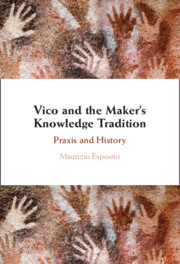Refine search
Actions for selected content:
2 results
Introduction
-
- Book:
- Vico and the Maker's Knowledge Tradition
- Published online:
- 27 June 2025
- Print publication:
- 17 July 2025, pp 1-24
-
- Chapter
- Export citation

Vico and the Maker's Knowledge Tradition
- Praxis and History
-
- Published online:
- 27 June 2025
- Print publication:
- 17 July 2025
